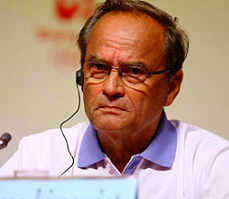London (Reuters) – The IAAF has continued its fightback against widespread allegations that it failed to act on hundreds of suspicious blood tests by highlighting a strong message of support from one of the “pioneers” of the anti-doping movement.

Since last weekend’s revelations by The Sunday Times newspaper and German broadcaster ARD, track and field’s governing body has been working overtime to repair an image sullied by leaked data connected with thousands of anti-doping tests between 2001-12.
Earlier this week the International Association of Athletics Federations said the insinuation that it had turned a blind eye to doping was “sensationalist and confusing.”
In its latest statement on Saturday, the IAAF said it was “pleased to receive a message of support” from Professor Arne Ljungqvist – former chairman of the IOC Medical Commission and vice president of the World Anti-Doping Agency (WADA).
The IAAF quoted Ljungqvist, an honorary life vice-president of the athletics governing body, in a statement saying: “The IAAF did more than others, before the others, but is now criticised by people, who have no insight into the work of IAAF, for not having done enough.
“Regrettably, I did not hear any criticism against the many sports and anti-doping organisations who have never implemented a robust blood testing programme as part of their anti-doping programme.
“This is highly unfair to the IAAF, an institution which should be regarded in high esteem for its countless efforts and investment, throughout its history, to tackle doping in athletics in the most efficient and intelligent way.”
Former Swedish high jumper Ljungqvist, who is also an honorary member of the IOC, praised the IAAF’s record in rooting out cheats.
“The IAAF has historically been at the forefront of all important developments in the fight against doping and has always taken its responsibilities seriously when it comes to catching cheats and protecting the integrity of its sport.
“The IAAF has been involved in all major developments of the fight against doping, including the introduction of the first blood tests for anti-doping purposes back in the early 1990s.
“The IAAF did pioneer investigations more than 20 years ago when blood sampling for anti-doping purposes was judged to be impossible on a global basis for ethical and religious reasons.”
While the two Australian blood doping specialists who analysed the data presented to the two media outlets have defended their findings, the IAAF continues to insist that blood data had been used “out of context.”
“As WADA also has stated, any judgement on blood sample must be based on the analysis of three appointed experts. We cannot accept ‘Trial by Media’ based on ‘rogue samples’ and analysis which is taken out of context,” the organisation said.
